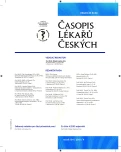Gastric lavage after peroral intoxication – controversial views
Authors:
Rostislav Večeřa 1; Peter Ondra 2; Jaroslav Jezdinský 1; Milan Adamus 3
Authors‘ workplace:
Ústav farmakologie Lékařské fakulty Univerzity Palackého, Olomouc
1; Ústav soudního lékařství a medicínského práva Lékařské fakulty Univerzity Palackého a Fakultní nemocnice, Olomouc
2; Klinika anesteziologie, resuscitace a intenzivní medicíny Lékařské fakulty Univerzity Palackého a Fakultní nemocnice, Olomouc
3
Published in:
Čas. Lék. čes. 2015; 154: 174-175
Category:
Review Article
Overview
Gastric lavage after ingestion of excessive amounts of a drug/poison – yes or no? If yes, at what time intervals from ingestion? On one side stand some authors who emphasize the complications, contraindications, and low yield of this procedure. These authors recommended that gastric lavage should be performed only within 30–60 minutes after ingestion of toxic doses of a drug/poison. Later lavage usually has no clinical benefit. On the other side stand some other authors who recommend gastric lavage in patients as late as 6 hours after intoxication. In some cases, when the ingested substance slows gastric emptying, they even recommend lavage until 24 hours after intoxication. Based on our experience, it is necessary to support strongly the second group of the authors and recommend the extension of the time interval when to perform gastric lavage in intoxication.
Keywords:
gastric lavage – intoxication – guidelines
Sources
1. Vale JA, et al. Position paper: Gastric lavage. J Toxicol Clin Toxicol 2004; 42(7): 933–943.
2. Benson BE, et al. Position paper update: gastric lavage for gastrointestinal decontamination. Clin Toxicol 2013; 51 : 140–146.
3. Pelclová D. Aktuální trendy v léčení intoxikací. Postgrad med 2004; 6(1): 16–20.
4. Drábková J, Ticháček M. Akutní intoxikace po požití léků. http://www.cls.cz/seznam-doporucenych-postupu
5. Čikl J. Akutní intoxikace. Sestra 2010; 20(1): 60–62.
6. Ševčík P. Akutní intoxikace. In: Ševčík P, et al. Intenzivní medicína, 2. vydání. Praha: Galén 2003; 247–270.
7. Ševčík P. Intoxikace. In: Ševčík P, et al. Intenzivní medicína, 3. vydání. Praha: Galén 2014; 795–825.
8. Balíková M. Forenzní a klinická toxikologie – laboratorní toxikologická vyšetření. Praha: Galén 2004.
Labels
Addictology Allergology and clinical immunology Angiology Audiology Clinical biochemistry Dermatology & STDs Paediatric gastroenterology Paediatric surgery Paediatric cardiology Paediatric neurology Paediatric ENT Paediatric psychiatry Paediatric rheumatology Diabetology Pharmacy Vascular surgery Pain management Dental HygienistArticle was published in
Journal of Czech Physicians

- Advances in the Treatment of Myasthenia Gravis on the Horizon
- Possibilities of Using Metamizole in the Treatment of Acute Primary Headaches
- Metamizole at a Glance and in Practice – Effective Non-Opioid Analgesic for All Ages
- Metamizole vs. Tramadol in Postoperative Analgesia
- Spasmolytic Effect of Metamizole
-
All articles in this issue
- The story of Appendix
- Gout and its manifestations, description and treatment in ancient times
- A short history of infectious diseases since the fifties of the last century and the importance of vaccination
- New options for therapeutic revascularization in lower extremity limb ischemia linked to the diabetic foot syndrome by autologous stem cell transplantation
- IgA Nephropathy. Facts, uncertainties, and potential causal therapy approaches
- Gastric lavage after peroral intoxication – controversial views
- Health effects of ambient ultrafine particles – the project UFIREG
- Analysis of serum levels of Dickkopf-1 (DKK-1) in monoclonal gammopathy of undetermined significance and multiple myeloma
- Journal of Czech Physicians
- Journal archive
- Current issue
- About the journal
Most read in this issue
- Gastric lavage after peroral intoxication – controversial views
- The story of Appendix
- A short history of infectious diseases since the fifties of the last century and the importance of vaccination
- IgA Nephropathy. Facts, uncertainties, and potential causal therapy approaches
